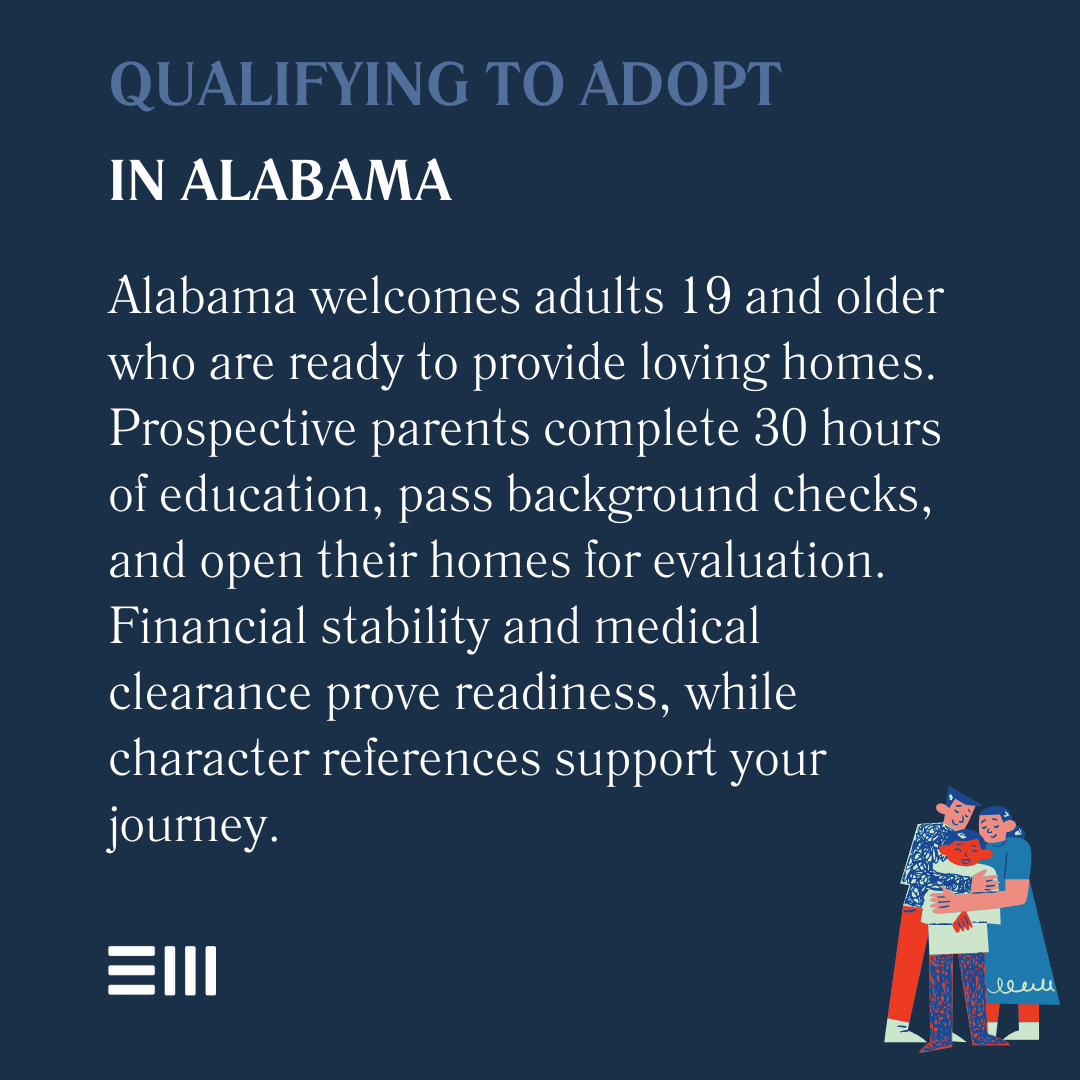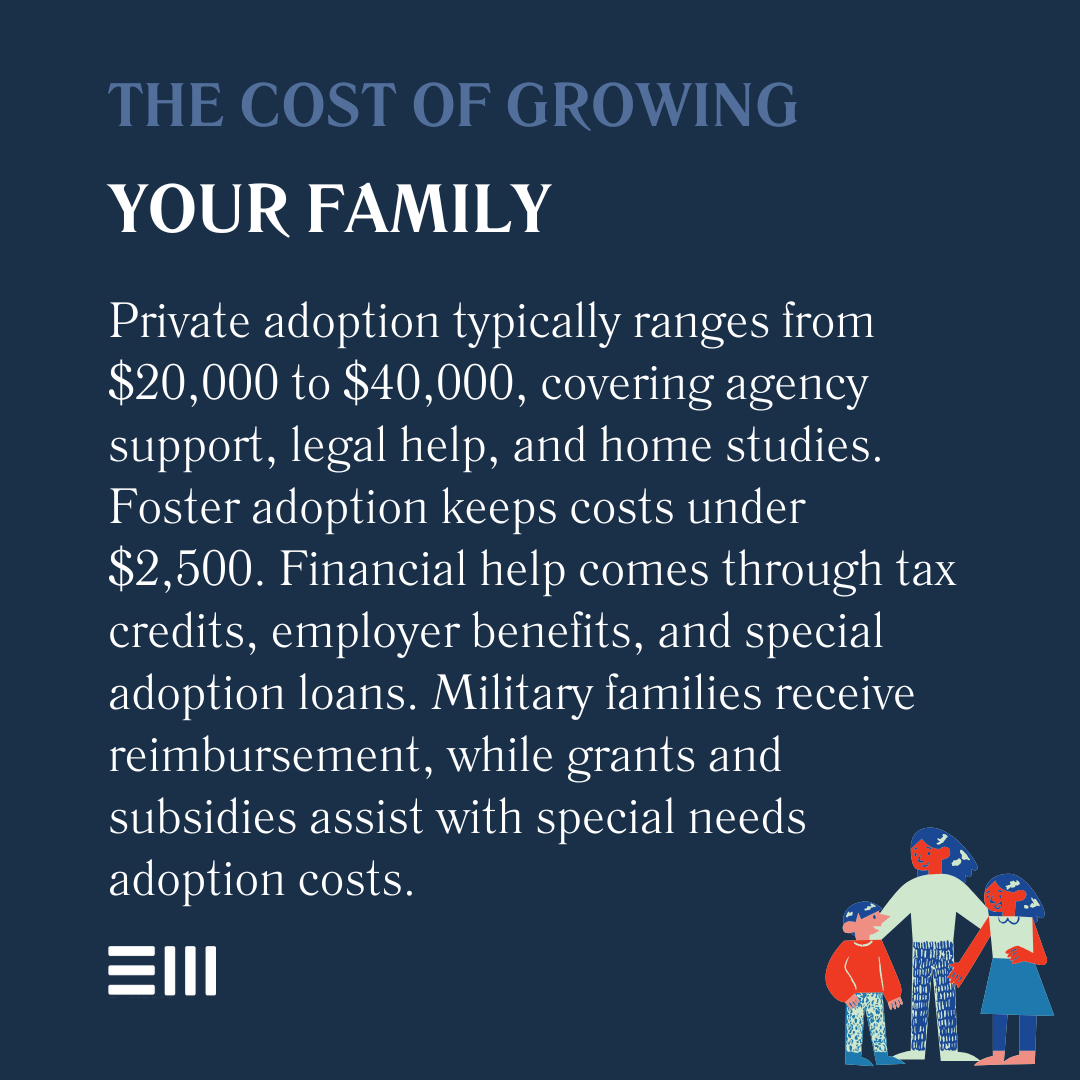In 2023, a total of 741 children were adopted in Alabama. Behind each successful adoption story lies a careful understanding of the state's legal framework that helps transform hope into reality.
Behind every successful adoption lies a story of hope, perseverance, and love.
Each path to building a family through adoption weaves through Alabama's carefully structured legal system, a framework designed to transform dreams of parenthood into reality while protecting every child's right to a stable, nurturing home.
Who Can Adopt in Alabama
Starting the adoption journey requires understanding who qualifies under Alabama law. The state aims to ensure stable, loving homes for children while maintaining clear standards for prospective parents.
To adopt in Alabama, prospective parents must:
- Be at least 19 years old;
- Pass comprehensive background checks, including FBI fingerprinting;
- Demonstrate financial stability through employment verification and tax returns;
- Complete mandatory pre-adoption education (minimum 30 hours);
- Show proof of residence in Alabama for at least 6 months;
- Provide references from non-family members who can attest to parenting capabilities;
- Complete a thorough home study evaluation;
- Submit medical clearance from a licensed physician;
- Verify marital status and provide relevant documentation; and
- Demonstrate emotional readiness through psychological evaluation.
Whether you're single or married, Alabama welcomes qualified individuals committed to providing loving homes for children. The state places no restrictions based on race, religion, or sexual orientation in determining adoption eligibility.
The Alabama Adoption Process
The path to adoption involves several carefully structured steps designed to protect both children and adoptive families. Understanding these steps helps create realistic expectations and smoother transitions.
Key steps in the Alabama adoption process include:
- Initial consultation with an adoption professional or agency;
- Completion of adoption application and preliminary documentation;
- Background screening and clearances at state and federal levels;
- Home study evaluation and approval (typically 2-3 months);
- Matching with a child or birth mother through various channels;
- Legal paperwork and court proceedings preparation;
- Post-placement supervision (minimum 3 visits);
- Finalization hearing before a judge;
- Issuance of new birth certificate; and
- Optional post-adoption support services.
Each step builds upon the previous one, creating a solid foundation for successful adoption outcomes. The process typically includes multiple meetings with social workers, legal professionals, and agency representatives.
Types of Adoption in Alabama
Alabama offers various adoption paths to accommodate different family situations and preferences. Each type has unique requirements and considerations that prospective parents should carefully evaluate.
Available adoption types include:
- Domestic infant adoption through private agencies or attorneys;
- Foster-to-adopt programs through the Department of Human Resources;
- International adoption with Hague Convention compliance;
- Relative adoption for family members assuming legal responsibility;
- Stepparent adoption streamlining family unity;
- Adult adoption for establishing legal family bonds;
- Independent adoption working directly with birth parents;
- Agency adoption with full-service support; and
- Identified adoption combining independent and agency approaches.
Understanding these options helps families choose the path that best aligns with their circumstances and goals. Each type offers different levels of support, cost structures, and timeline expectations.
Financial Aspects of Adoption
Planning for adoption requires a clear understanding of the associated costs and available financial resources. Being well-informed about expenses helps families prepare adequately for their adoption journey.
Common expenses include:
- Agency fees for services and support;
- Legal representation and court costs;
- Home study and background check fees;
- Birth mother medical expenses (in applicable cases);
- Travel expenses for domestic or international adoption;
- Post-placement supervision costs;
- Document preparation and certification fees; and
- Required education and training expenses.
These costs vary significantly based on the type of adoption you pursue and specific circumstances of your case. However, numerous financial resources exist to help families manage these expenses.
Financial assistance options:
- Federal adoption tax credit;
- Employer adoption benefits;
- Military adoption reimbursement;
- Adoption grants and scholarships;
- Low-interest adoption loans; and
- State subsidies for special needs adoption.
With careful planning and utilization of available resources, many families successfully navigate the financial aspects of adoption. Remember that investment in adoption is an investment in your family's future, and numerous support systems exist to help make it possible.
Birth Parent Rights and Responsibilities
Understanding the legal framework surrounding birth parent rights helps all parties navigate the adoption process with clarity and confidence. These rights protect both birth parents and children while establishing clear guidelines for the adoption process.
Key aspects include:
- Consent requirements and timing;
- Rights of putative fathers;
- Revocation periods and procedures;
- Confidentiality provisions;
- Future contact agreements;
- Medical history disclosure;
- Financial support guidelines; and
- Legal representation rights.
These rights and responsibilities create a balanced framework that respects birth parents while protecting the best interests of the child. Understanding these elements helps create smoother adoptions with fewer complications or delays.
Building Your Support Network
Creating a strong support system is essential for navigating the adoption journey successfully. Having the right resources and connections can make a significant difference in your experience.
Key support elements include:
- Adoption support groups;
- Professional counseling services;
- Educational workshops;
- Online communities;
- Agency resources;
- Legal advisors;
- Medical professionals;
- Cultural consultants; and
- Financial advisors.
Building this network before and during the adoption process provides valuable resources and emotional support. These connections often become lifelong relationships that benefit both parents and children throughout their adoption journey.
Common Questions About Alabama Adoption
Navigating adoption involves many important questions.
Here are answers to the most frequently asked questions about Alabama's adoption process.
How Long Does the Adoption Process Take in Alabama?
The timeline varies depending on the type of adoption, but most domestic adoptions take between 6-18 months from initial application to finalization.
What Are the Costs Associated With Adoption in Alabama?
Adoption costs typically range from $20,000-$40,000 for private adoptions, including agency fees, legal expenses, and home study costs. Foster adoption costs are minimal, often under $2,500.
Can Birth Parents Change Their Mind?
In Alabama, birth parents have 5 days after signing consent to revoke their decision. After this period, consent becomes irrevocable except in cases of fraud.
What Rights Do Adoptive Parents Have?
Once finalized, adoptive parents have the same legal rights and responsibilities as biological parents.
What Post-Adoption Support is Available?
Alabama offers various post-adoption services, including counseling, support groups, and educational resources for both adoptive families and adoptees.
Legal Requirements and Documentation
Success in adoption requires careful attention to legal requirements and proper documentation. Having these elements in order helps avoid delays and complications.
Essential documentation includes:
- Valid identification and proof of residence
- Marriage certificate (if applicable)
- Income verification
- Medical clearance
- Background check results
- Home study report
- Birth parent consent forms
- Adoption petition
- Post-placement reports
Maintaining organized records throughout the process helps ensure smooth progression toward finalization.
Take the Next Step Toward Building Your Family
Ready to begin your adoption journey?
Our experienced team of adoption attorneys understands the complexities of Alabama adoption law and can guide you through each step of the process.
Contact us today for a confidential consultation and learn how we can help make your dream of adoption a reality.


